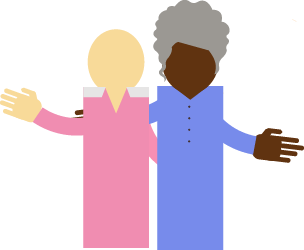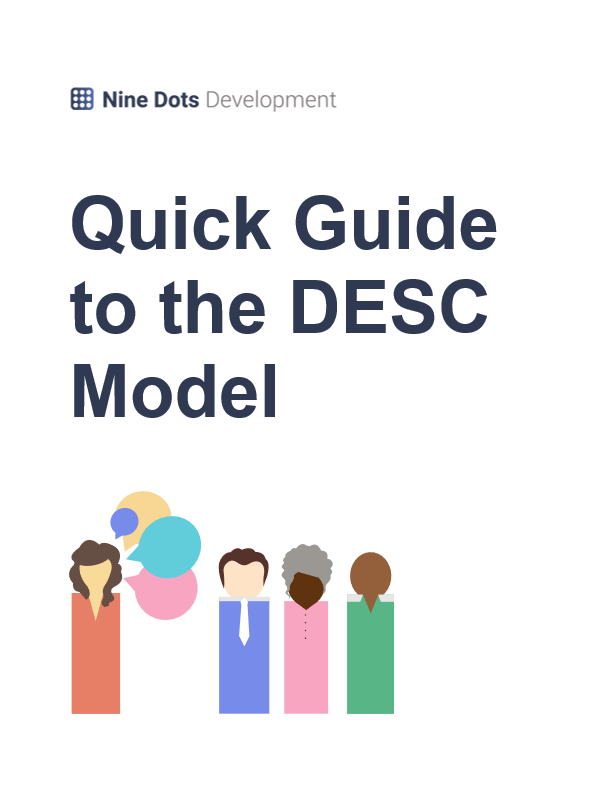Friday 10 Sep 2021 Article
The TakeawayDealing with the 4 Types of Behaviour During Conflict
Conflict Resolution 101
Part 3
#ConflictResolution #DifficultConversations #Behaviour #PrimaryModesofBehaviour #DESCModel #PersonalDevelopment
The perfectly matched resource for this article...
Download Our Quick Guide to the D.E.S.C. Model!
A really simple way of instantly becoming more assertive is to use the D.E.S.C. model to put everything you have learnt in our ‘Conflict Resolution 101’ article series into practice. To find out more about what this model is and how to use it, please click the button below to download our Quick Guide to the D.E.S.C. Model.
Download guide!Dealing with the 4 Types of Behaviour During Conflict
Handling conflict is a complex task; there is no one-size-fits-all solution, and learning the theory behind conflict resolution will only get you so far if you don’t put it into practice.
A great analogy for this is learning to play golf - no matter how much research you do and how long you spend watching others play, until your golf club actually strikes that ball, you can’t become a fantastic golfer. Similarly, until you start putting action behind the theory you have learnt, you can’t master conflict resolution.
In today’s article, we explore the 4 primary modes of behaviour and a fantastic model for easily putting all of this knowledge into practice.
The 4 Primary Modes of Behaviour
The 4 Primary Modes of Behaviour describe the different ways people respond and behave when faced with conflict. Understanding these modes is crucial as behaving in the wrong way could severely undermine your impact as a leader and cause you to lose your team’s trust and respect.
Mode 1: Passive
People who are passive in the face of conflict often act indifferent to the situation and find it difficult or simply choose not to:
- Stand their ground
- Express their opinions
- Say ‘no’ to people
- Make decisions
They give into others’ wishes in an attempt to avoid further conflict or confrontation. This can not only make it difficult to come to a mutually-beneficial resolution as passive people don’t typically express their needs, but constantly saying ‘yes’ to people can also lead to an unmanageable workload and even burnout.
Mode 2: Aggressive
In terms of conflict in the workplace, being aggressive means always wanting to ‘win’ the conflict by doing what’s in your own best interest with little to no regard for the emotions, needs, or desires of others. Aggressive people have no problem with saying ‘no’ to others, but they don’t always do it in a respectful way and tend to say ‘no’ even to reasonable requests. They also tend to have a loud, hot-headed, very vocal nature, which can make others feel like they can’t stand up for themselves and voice their side of the story. This can make resolving conflict extremely challenging as it’s often difficult to get somebody aggressive to see others’ perspectives or make a compromise.
{{ADVERT}}
Mode 3: Passive-aggressive
Passive-aggressive people seem passive on the surface but actually behave aggressively, just in a less overt, extreme way. Passive-aggressiveness is often shown in the form of:
- Unnecessary, negative comments
- Sarcasm
- Stubbornness
- Irritability
- Denial of own problems
- Undermining others’ problems
- A cynical attitude to work
Trying to resolve conflict with passive-aggressive people can be frustrating as they often harbour unhappy, dissatisfied feelings but won’t express them, making them almost impossible to resolve.
Mode 4: Assertive
Whilst there are many skills that contribute to effective conflict management, there is one overarching skill that is absolutely vital - assertiveness.
Being assertive means valuing and voicing your wants and needs while remaining considerate of others’ rights, needs, wants, and feelings. When you’re assertive, you firmly but fairly get your point across. Resolving conflict with assertive people is typically by far the easiest of these 4 modes of behaviour as assertive people are happy to express their concerns in a non-aggressive way, making them much easier to resolve. Assertive people are also typically good at decision-making as they assess all sides/perspectives of the situation and then have the confidence to make a well-informed decision and stick to it. This ability to effectively and efficiently resolve conflict whilst being considerate of others earns respect from all parties involved and can help build and maintain good working relationships.

How to Become More Assertive
A really simple way of instantly becoming more assertive is to use the D.E.S.C. model to put everything you have learnt in our ‘Conflict Resolution 101’ article series into practice.
To find out more about what this model is and how to use it, please click here or follow the link below to download our Quick Guide to the DESC Model.
https://ninedots.co.uk/web/TheDESCModel
---
Until next time..
Download Our Quick Guide to the D.E.S.C. Model!
A really simple way of instantly becoming more assertive is to use the D.E.S.C. model to put everything you have learnt in our ‘Conflict Resolution 101’ article series into practice. To find out more about what this model is and how to use it, please click the button below to download our Quick Guide to the D.E.S.C. Model.
Download guide!Missed an article?
More from Conflict Resolution 101
